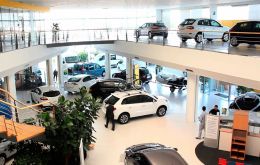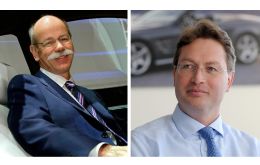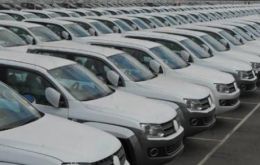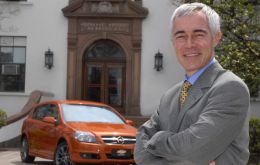MercoPress. South Atlantic News Agency
Tag: cars
-
Wednesday, February 5th 2020 - 06:53 UTC
UK to ban sale of petrol, diesel and hybrid cars from 2035

Britain will ban the sale of new petrol, diesel and hybrid cars from 2035, five years earlier than planned, in an attempt to reduce air pollution that could herald the end of over a century of reliance on the internal combustion engine.
-
Tuesday, April 2nd 2019 - 09:50 UTC
Sales of new cars in Argentina crash 50% in first quarter of the year

Sales of new cars in Argentina collapsed by almost 50% in the first quarter of 2019, the Association of Automobile Dealers of Argentina (ACARA) said Monday. Sales fell by 49.5% in the year-on-year comparison, with purchases down 50.4% in March year-on-year too, said ACARA.
-
Thursday, September 27th 2018 - 08:44 UTC
A Swede takes over as Daimler CEO and to grapple with diesel emissions cheating

Daimler, the German car maker that owns Mercedes-Benz, will be run by a non-German for the first time next year. Dieter Zetsche, 65, will be replaced by Ola Kaellenius, a 49-year-old Swede, as chief executive in a succession plan announced on Wednesday.
-
Wednesday, June 12th 2013 - 07:14 UTC
Car sales in Brazil full speed ahead; 1.4 million units sold in five months

Car sales in Brazil are setting new levels almost every month and May has been no exception, with 300,940 units sold beating the previous May record of 300,514 cars (registered in 2011).
-
Sunday, April 1st 2012 - 08:02 UTC
Argentina targets Mexican car imports and considers revoking trade agreement

Argentina is considering applying measures to restrict the import of Mexican cars, which could include unilaterally denouncing the Economic Complementation Agreement (ACE) 55, which regulates bilateral trade, Argentine government sources told local media, ámbito.com.
-
Wednesday, March 14th 2012 - 00:07 UTC
Brazil turns protectionist: wants Mexico to limit car exports to 1.4bn in three years

Brazil's government wants Mexico to impose quotas on its own auto exports to the South American nation to ensure the total value does not exceed 1.4 billion dollars over the next three years, the development, industry and foreign trade ministry said.
-
Thursday, September 29th 2011 - 00:48 UTC
Raul Castro drops 50-year ban: Cubans allowed buying and selling cars

Cuba authorized auto sales among individuals Wednesday, easing a 50-year-old ban that has helped make the Castro brothers-ruled island a living museum of vintage cars.
-
Wednesday, September 21st 2011 - 00:49 UTC
Uruguay alert to the extent of Brazil recent measures on auto imports

Uruguayan president Jose Mujica admitted a certain ‘stinging feeling’ following the recent Brazilian decision to increase import taxes on vehicles by 30%, which could also have an impact on Mercosur partners.
-
Tuesday, August 16th 2011 - 06:06 UTC
Industrial activity soars 9.3% in Argentina led by the auto production

Argentina's industrial activity in June rose 9.3% on the year led by automobile production, according to manufacturers association UIA (Argentine Industrial Union).
-
Tuesday, August 2nd 2011 - 07:03 UTC
Brazil forecasted to become world’s third largest automobile manufacturer

Brazil’s car production capacity is expected to jump from the current 3.6 million units per year to 6.2 million by 2025 supported by massive investments from the industry estimated in 19 billion dollars by 2017, according to estimated from the Vanzolini Foundation in Sao Paulo.
